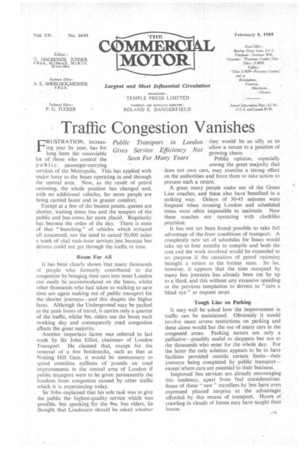Traffic Congestion Vanishes
Page 31

If you've noticed an error in this article please click here to report it so we can fix it.
FRUSTRATION, increasing year by year, has for long been the unenviable lot of those who control the public passenger-carrying services of the Metropolis. This has applied with major force to the buses operating in and through the central area. Now, as the result of petrol rationing, the whole position has changed and, with no additional vehicles, far more people are being carried faster and in greater comfort.
Except at a few of the busiest points, queues are shorter, waiting times less and the tempers of the public and bus crews far more placid. ' Regularity has become the order of the day. There is none of that " bunching " of vehicles which irritated all concerned, nor the need to cancel 50,000 miles a week of vital rush-hour services just because bus drivers could not get through the traffic in time.
Room For All It has been clearly shown That many thousands of people who formerly contributed to the congestion by bringing their cars into inner London can easily be accommodated on the buses, whilst other thousands who had taken to walking to save time are again making use of public transport for the shorter journeys—and this despite the higher fares. Although the Underground may be packed at the peak hours of travel, it carries only a quarter of the traffic, whilst 9m. riders use the buses each working day and consequently road congestion affects the great majority.
Another important factor was referred to last week by Sir John Elliot, chairman of London Transport. He claimed that, except for the removal of a few bottlenecks, such as that at Notting Hill Gate, it would be unnecessary to spend countless millions of pounds on road improvements in the central area of London if public transport were to be given permanently the freedom from congestion caused by other traffic which it is experiencing today.
. Sir John explained that his sole task was to give the public the highest-quality service which was possible, but speaking for the 9m. bus riders, he thought that Londoners should be asked whether they would be so silly as to allow a return to a position of growing chaos.
Public opinion, especially among the great majority that does not own cars, may exercise a strong effect on the authorities and force them to take action to prevent such a return.
A great many people make use of the Green Line coaches, and these also have benefited in a striking way. Delays of 30-45 minutes were frequent when crossing London and scheduled times were often impossible to maintain. Now these coaches are operating with clocklike precision.
It has not yet been found possible to take full advantage of the freer conditions of transport. A completely new set of schedules for buses would take up to four months to compile and both the cost and the work involved would be expended to no purpose if the cessation of petrol rationing brought a return to the former state. So far, however, it appears that the time occupied by many bus journeys has already been cut by up to a third, and this without any excessive speeding or the previous temptation to drivers to "turn a blind eye" at request stops.
Tough Line on Parking It may well be asked how the improvement in traffic can be maintained. Obviously it would involve more severe restrictions on parking and these alone would bar the use of many cars in the congested areas. Parking meters are only a palliative—possibly useful to shoppers but not to the thousands who enter for the whole day. For the latter the only solution appears to be to have facilities provided outside certain limits—their journeys being completed by public transport-except where cars are essential to their business.
Improved bus services are already encouraging this tendency, apart from fuel considerations. Some of these "new " travellers by bus have even expressed pleased surprise at the advantages afforded by this means of transport. Hours of crawling in clouds of fumes may have taught their lesson.




































































































